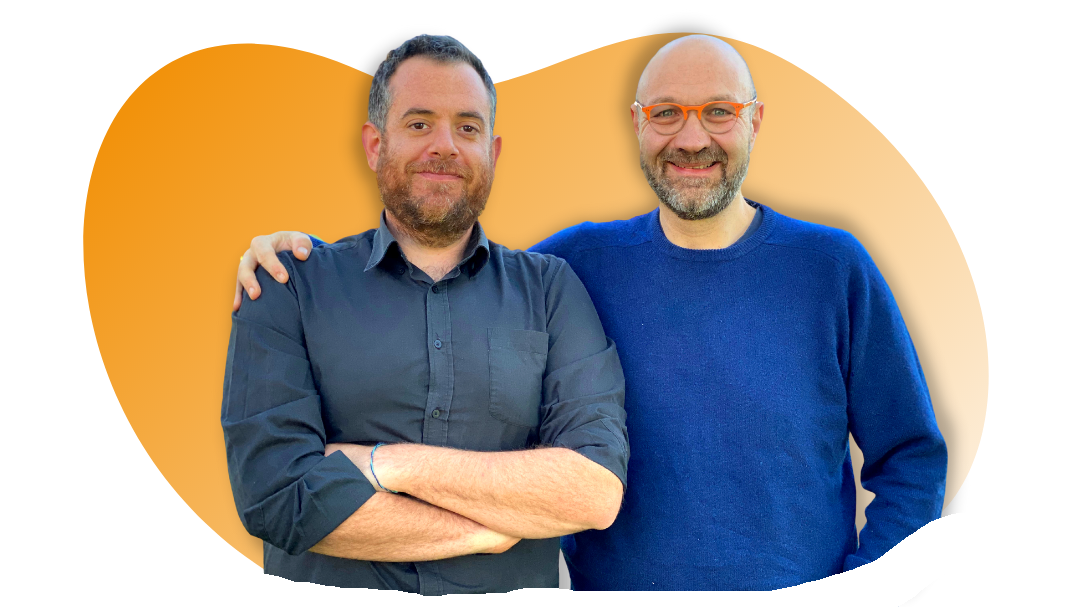"We created this programme to inspire and
support people in taking care of their health
throughout their lives, one step at a time."
Giorgio & Stefano
From day one our mission at Breaters that guides everything we do:
To help people make meaningful and lasting change
through small, incremental steps.

Giorgio Serafini Prosperi
Co-founder and
Programme Manager (Italy)
I was born in 1968. I have worked in all areas of the field of writing: as a theatre critic, journalist, playwright (I have won several prestigious prizes as a theatre author), television writer, film projects. In my "second life" I started practicing yoga and meditation. I teach awareness practices and I graduated as a Mindfulness counselor.
Why Breaters?
Breaters is not just a programme, it’s a commitment. I wanted to make these teachings as accessible to as many people as possible. For it to be a supportive journey based on the experience that has allowed me to free myself from a painful and problematic relationship with food, eating and my body. The need I had to free myself from my own food and weight struggles has now become a method. The tools that form Breaters are the same tools that have worked for me. Everything I learned on my journey from feeling sad and defeated, to a person grateful to be alive, are all found inside Breaters.

Stefano Iorino
Co-founder and
CEO
I was born to be an engineer. But the only structure I couldn’t design was my own life. That’s because I was still struggling with being at peace with my body. Traditional methods didn’t work, so thanks to the invitation of a friend, I agreed to look at the problem from another angle. By practicing awareness, my rebirth began and I left the suffering behind me.
Why Breaters?
Breaters makes complete sense and my desire is to make the programme a journey of growth, one that changed the quality of my life, now accessible to everyone. Myself and Giorgio shared from the very first meeting the same vision: to help to people, who like us, struggle with their relationship with food and emotions, more easy accessible.
Who Will Guide You?

Linn Thorstensson
Nutrition Therapist and
Mindful Eating Instructor
From my late teens into my mid twenties I struggled with emotional eating and had a difficult relationship with my body. As a nutrition professional who specialises in helping people with disordered eating I believe that food is much more than nutrients. We need to feed ourselves several times a day, and when this is an experience that is fraught with shame it makes our lives miserable.
Why Breaters?
I believe in the Breaters approach because I have experience some powerful changes through mindfulness and Mindful Eating, both personally and professionally with my clients. Learning to feed and nourish ourselves with kindness and compassion through awareness offers both rewarding and long lasting change.

Cinzia Pezzolesi
Clinical Psychologist and
Mindful Eating Teacher
I use an integrated approach of Cognitive Behavioral Therapy (CBT) and Mindfulness Interventions to promote a healthier, happier and more balanced lifestyle. I have a passion for Mindful Eating stemming from my personal experience as ex-professional athlete.
Why Breaters?
I believe that the Breaters approach will lead to long term sustainable changes in a gentle but equally powerful manner. In my many years as therapist I am very excited about finding an effective and targeted approach to tackle emotional eating.
Our story
If you're wondering about the meaning of the term Breaters, well here it is:
It comes from the fusion of two English verbs, to breathe and to eat.
Eat whilst breathing, that's the secret.

Putting a space between the impulse and the automatic responses we are used to doing, through awareness is the secret sauce.
Where no diet had worked in the past, awareness began to take root.
And so did friendship.
Stefano's "miracle" happened thanks to the care of Ilaria,
a friend of his who was studying psychotherapy,
who one day got tired of seeing him suffer and taught him to meditate.
Giorgio's passion is due to meeting many people who, like him, were trying to stop eating emotionally and whom explained to him that no matter what diet they tried, it never worked long term.
In order to stop overeating, one must first take care of one's own soul. To eat with intention and awareness. And to take care of our emotional needs too.
What is difficult to do alone, becomes possible together.
This is how the stories of the two founders turned their suffering and learnings into a programme that takes care of the challenging relationship with food, eating and our bodies through paying
attention to the cause (emotional suffering) instead of focusing on the effect (trying to control food intake).
Partners

You don't need another restrictive diet to try and control your binge eating.
Instead learn to heal your emotional eating with new coping tools, so you can stop stuffing them down with food.
It is time to find your way back to having a peaceful relationship with food and your body.


